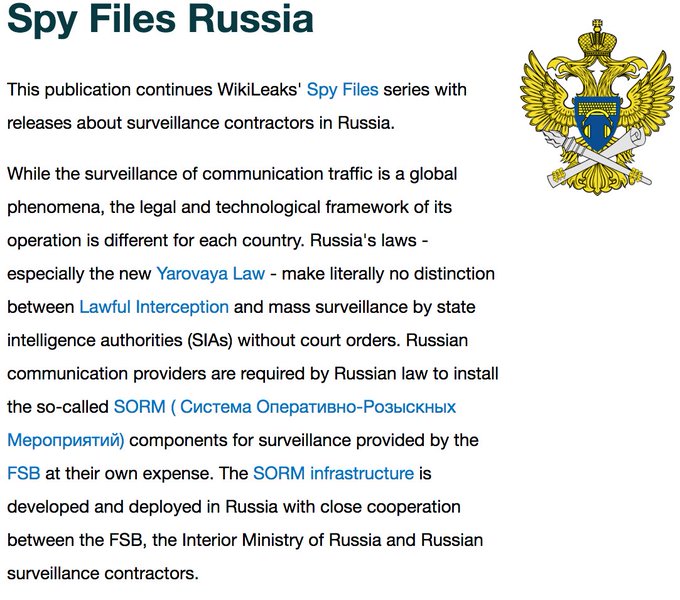 |
| Wikileaks releases documents it claims detail Russia mass surveillance apparatus |
Wikileaks has released a new cache of documents which it claims detail surveillance apparatus used by the Russian state to spy on Internet and mobile users. It's the first time the organization has leaked (what it claims is) material directly pertaining to the Russian state.
As ever, nothing is straightforward when it comes to Wikileaks. And founder Julian Assange continues to face charges that his 'radical transparency' organization is a front for Kremlin agents (charges that stepped up after Wikileaks released a massive trove of hacked emails from the DNC last year at a key moment in the U.S. presidential election).
Safe to say the Twitter arguments are already breaking out (e.g. see this tweet comment thread).
And it's not possible at this point to verify the veracity and/or value of the documents Wikileaks is releasing here.
Spy Files Russia
Writing a summary of the cache of mostly Russian-language documents, Wikileaks claims they show how a long-established Russian company which supplies software to telcos is also installing infrastructure, under state mandate, that enables Russian state agencies to tap into, search and spy on citizens' digital activity -- suggesting a similar state-funded mass surveillance program to the one utilized by the U.S.'s NSA or by GCHQ in the U.K. (both of which were detailed in the 2013 Snowden disclosures).
The documents which Wikileaks has published (there are just 34 "base documents" in this leak) relate to a St. Petersburg-based company, called Peter-Service, which it claims is a contractor for Russian state surveillance. The company was set up in 1992 to provide billing solutions before going on to become a major supplier of software to the mobile telecoms industry.
Wikileaks writes:
The technologies developed and deployed by PETER-SERVICE today go far beyond the classical billing process and extend into the realms of surveillance and control. Although compliance to the strict surveillance laws is mandatory in Russia, rather than being forced to comply PETER-SERVICE appears to be quite actively pursuing partnership and commercial opportunities with the state intelligence apparatus.
As a matter of fact PETER-SERVICE is uniquely placed as a surveillance partner due to the remarkable visibility their products provide into the data of Russian subscribers of mobile operators, which expose to PETER-SERVICE valuable metadata, including phone and message records, device identifiers (IMEI, MAC addresses), network identifiers (IP addresses), cell tower information and much more. This enriched and aggregated metadata is of course of interest to Russian authorities, whose access became a core component of the system architecture.
One of Wikileaks' initially stated media partners for the release, the Italian newspaper La Repubblica, (which has since been removed from the media partners' list and replaced with a different Italian publication's name -- so, er, working with Assange must surely be a lol a minute... ) reports that the documents cover "an extended timespan from 2007 to June 2015", and describes the contents as "extremely technical".
It also has a few caveats, noting the documents do not mention Russia's spy agency, the FSB, but rather "speak only of state agencies", a formula it asserts "certainly includes law enforcement, who use metadata for legal interception".
It also says the documents do "not clarify what other state apparatus accesses those data through the solution of the St. Petersburg company".
Wikileaks says that under Russia law operators must maintain a Data Retention System (DRS), which can store data for up to three years. La Repubblica reports that Peter-Service's DRS stores telephone traffic data and "allows Russian state agencies to query the database of all stored data in search of information" -- which it specifies can include calls made by a certain telephone company's customer; payment systems used; the cell phone number to which a user is calling.
"The manuals published by WikiLeaks contain the images of interfaces that allow you to search within these huge data fields, so access is simple and intuitive," it adds.

No comments:
Post a Comment